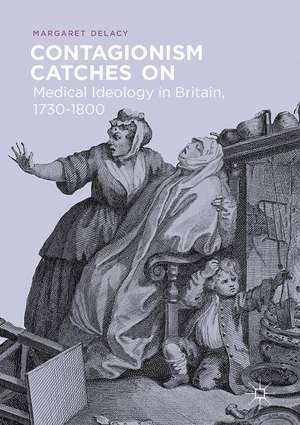Contagionism Catches On : Medical Ideology in Britain, 1730-1800
Autor Margaret DeLacyen Limba Engleză Hardback – 2 aug 2017
| Toate formatele și edițiile | Preț | Express |
|---|---|---|
| Paperback (1) | 743.86 lei 38-44 zile | |
| Springer International Publishing – 2 aug 2018 | 743.86 lei 38-44 zile | |
| Hardback (1) | 786.84 lei 6-8 săpt. | |
| Springer International Publishing – 2 aug 2017 | 786.84 lei 6-8 săpt. |
Preț: 786.84 lei
Preț vechi: 959.56 lei
-18% Nou
Puncte Express: 1180
Preț estimativ în valută:
150.56€ • 157.60$ • 125.32£
150.56€ • 157.60$ • 125.32£
Carte tipărită la comandă
Livrare economică 31 martie-14 aprilie
Preluare comenzi: 021 569.72.76
Specificații
ISBN-13: 9783319509587
ISBN-10: 3319509586
Pagini: 325
Ilustrații: IX, 347 p.
Dimensiuni: 148 x 210 mm
Greutate: 0.58 kg
Ediția:1st ed. 2017
Editura: Springer International Publishing
Colecția Palgrave Macmillan
Locul publicării:Cham, Switzerland
ISBN-10: 3319509586
Pagini: 325
Ilustrații: IX, 347 p.
Dimensiuni: 148 x 210 mm
Greutate: 0.58 kg
Ediția:1st ed. 2017
Editura: Springer International Publishing
Colecția Palgrave Macmillan
Locul publicării:Cham, Switzerland
Cuprins
1. Introduction
2. Fever Theory and British Contagionism in the Mid-Eighteenth Century
3. Contagionism after 1750: John Pringle and James Lind
4. Animate Disease after 1750: The “Exanthemata Viva”
5. Counting and Classifying Disease: Contagion, Enumeration and Cullen’s Nosology
6. John Haygarth and the Campaign for Contagion
7. Contagionism, Politics and the Public in Manchester
8. Institutionalizing Contagionism: The Manchester House of Recovery
2. Fever Theory and British Contagionism in the Mid-Eighteenth Century
3. Contagionism after 1750: John Pringle and James Lind
4. Animate Disease after 1750: The “Exanthemata Viva”
5. Counting and Classifying Disease: Contagion, Enumeration and Cullen’s Nosology
6. John Haygarth and the Campaign for Contagion
7. Contagionism, Politics and the Public in Manchester
8. Institutionalizing Contagionism: The Manchester House of Recovery
Recenzii
“The book consists of nine densely packed and detailed chapters, including the introduction and conclusion. … Each chapter covers new areas in the jagged road leading to contagionism and its competitors. … DeLacys sources are international, with material in English, Latin, Italian and French. A very careful historian, she notes bibliographical mistakes that scholars have made … . The source notes contain much of interest and should not be skipped. Margaret DeLacy passed the stimulus test with flying colors.” (Shelby Shapiro, The Independent Scholar, Vol. 8, December, 2021)
“This book is a study of a revolution in pathology that occurred in Britain in the second half of the eighteenth century. … Margaret DeLacy’s study is a valuable contribution to the existing literature.” (Laurence Brockliss, Isis, Vol. 109 (4), December, 2018)
“This book is a study of a revolution in pathology that occurred in Britain in the second half of the eighteenth century. … Margaret DeLacy’s study is a valuable contribution to the existing literature.” (Laurence Brockliss, Isis, Vol. 109 (4), December, 2018)
Notă biografică
Margaret DeLacy is the author of The Germ of an Idea: Contagionism, Religion and Society in Britain, 1660-1730 (Palgrave MacMillan, 2016), Prison Reform in Lancashire, 1700-1850: A Study in County Administration (Stanford University Press, 1986), and articles on medical history. She is an independent scholar in Portland Oregon.
Textul de pe ultima copertă
This book shows how contagionism evolved in eighteenth century Britain and describes the consequences of this evolution. By the late eighteenth century, the British medical profession was divided between traditionalists, who attributed acute diseases to the interaction of internal imbalances with external factors such as weather, and reformers, who blamed contagious pathogens. The reformers, who were often “outsiders,” English Nonconformists or men born outside England, emerged from three coincidental transformations: transformation in medical ideas, in the nature and content of medical education, and in the sort of men who became physicians. Adopting contagionism led them to see acute diseases as separate entities, spurring a process that reoriented medical research, changed communities, established new medical institutions, and continues to the present day.
Caracteristici
Provides the social outcome of the acceptance of contagionism, proposed and explored in DeLacy’s first book, The Germ of an Idea (Palgrave Macmillan, 2016)
Appeals to cultural and social historians, as well as historians of medicine and eighteenth century Britain
Describes the consequences of the evolution of contagionism in eighteenth century Britain
Appeals to cultural and social historians, as well as historians of medicine and eighteenth century Britain
Describes the consequences of the evolution of contagionism in eighteenth century Britain










